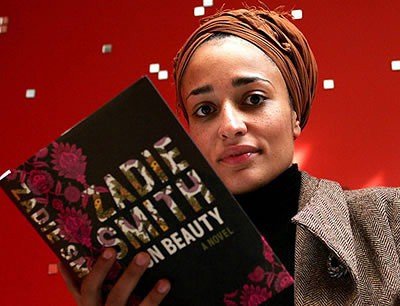Who’s my favourite female writer?
Why I love Zadie Smith?
If I had to choose my favourite female writer, I would answer without thinking: Zadie Smith. I haven’t read her last two books yet, but I have four behind me, and the first two, which fell into my hands, turned my world upside down. I read "White Teeth" almost 8 years ago, "On Beauty" - a year later. I still plan to repeat both of them and verify the admiration of that time and I postpone it all the time. For now, however, I have memories and on their basis I take responsibility for this recommendation.

Smith's prose is, and at the same time, not about women: in the two titles they are in the foreground, and these latter are crucial for the final reflections, but in fact both books talk about a contemporary, multicultural world in which the concepts of nationality and homeland begin to blur. We observe the fates of families - English and American, but at the same time about Haitian, Jamaican, Indian, Jewish and other roots: the core of their history are attempts to find a place in society, reconciling their cultural identity with the realities of everyday life. It isn’t easy to cultivate your roots, since they are known only from the stories of mothers and grandmothers. It isn’t easy to love a native country and native culture if the memory of them is associated with trauma. What do you need to do to be called an Englishman, an American? And if you are an Englishman, you can speak with pride about your Jamaican origins? As modern and progressive people, we want to instinctively say that, of course, the problem: the experts know, however, that it isn’t so simple. Having two homelands means often not having any, nowhere to be really at home.
Since the premiere of these books, a lot of time has passed - "White teeth" were published in 1999, "On Beauty" - in 2005. None of them necessarily, therefore, take into account the current tensions associated with migration and the situation of refugees in Europe and the United States, not it devotes a lot of space to politics as such. Perhaps this is why both of them remain so valid, speaking in a universal way about the mechanisms of assimilation and about how important it is to reconcile the past with the present, the origin of everyday life. Smith knows these issues from autopsy: her mother came from Jamaica, father was (is?) an Englishman - in "White Teeth" you can easily find this family and maybe this will allow you to understand how the author's life could look like, what doubts she could have struggle, growing up.
This is the literature at which reception must be a bit wanted, which requires a certain openness and good intentions, above all a desire to understand the mechanisms behind intercultural tensions in the modern world. It doesn’t look for excuses, but helps to understand where the sources of problems lie, what mistakes have been made in building a multilingual, multicolored and multi-religious society, composed of people who really don’t connect. Zadie Smith makes us realize how important it is to be able to maintain individuality, to cultivate one's cultural identity, and to feel the acceptance of how important it is to become aware of belonging. She reminds us that real equality is necessary to build a healthy society not only against law, but also social norms, and true justice doesn’t mean the same treatment for all regardless of circumstances, but rather consistent equalization of opportunities. The feeling of tearing and confusion in the world that Smith describes goes far beyond the issue of migration and refugees - after years it is even more clear that it is simply a sign of our times.